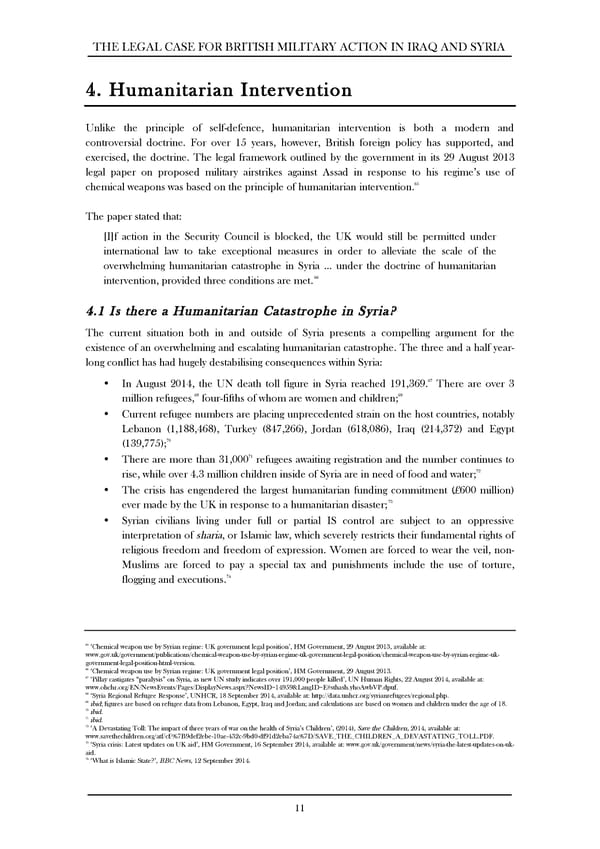THE LEGAL CASE FOR BRITISH MILITARY ACTION IN IRAQ AND SYRIA 4. Humanitarian Intervention Unlike the principle of self-defence, humanitarian intervention is both a modern and controversial doctrine. For over 15 years, however, British foreign policy has supported, and exercised, the doctrine. The legal framework outlined by the government in its 29 August 2013 legal paper on proposed military airstrikes against Assad in response to his regime’s use of 65 chemical weapons was based on the principle of humanitarian intervention. The paper stated that: [I]f action in the Security Council is blocked, the UK would still be permitted under international law to take exceptional measures in order to alleviate the scale of the overwhelming humanitarian catastrophe in Syria … under the doctrine of humanitarian intervention, provided three conditions are met. 66 4.1 Is there a Humanitarian Catastrophe in Syria? The current situation both in and outside of Syria presents a compelling argument for the existence of an overwhelming and escalating humanitarian catastrophe. The three and a half year- long conflict has had hugely destabilising consequences within Syria: 67 • In August 2014, the UN death toll figure in Syria reached 191,369. There are over 3 68 69 million refugees, four-fifths of whom are women and children; • Current refugee numbers are placing unprecedented strain on the host countries, notably Lebanon (1,188,468), Turkey (847,266), Jordan (618,086), Iraq (214,372) and Egypt 70 (139,775); 71 • There are more than 31,000 refugees awaiting registration and the number continues to 72 rise, while over 4.3 million children inside of Syria are in need of food and water; • The crisis has engendered the largest humanitarian funding commitment (£600 million) 73 ever made by the UK in response to a humanitarian disaster; • Syrian civilians living under full or partial IS control are subject to an oppressive interpretation of sharia, or Islamic law, which severely restricts their fundamental rights of religious freedom and freedom of expression. Women are forced to wear the veil, non- Muslims are forced to pay a special tax and punishments include the use of torture, flogging and executions.74 65 ‘Chemical weapon use by Syrian regime: UK government legal position’, HM Government, 29 August 2013, available at: www.gov.uk/government/publications/chemical-weapon-use-by-syrian-regime-uk-government-legal-position/chemical-weapon-use-by-syrian-regime-uk- government-legal-position-html-version. 66 ‘Chemical weapon use by Syrian regime: UK government legal position’, HM Government, 29 August 2013. 67 ‘Pillay castigates “paralysis” on Syria, as new UN study indicates over 191,000 people killed’, UN Human Rights, 22 August 2014, available at: www.ohchr.org/EN/NewsEvents/Pages/DisplayNews.aspx?NewsID=14959&LangID=E#sthash.yhoAwbVP.dpuf. 68 ‘Syria Regional Refugee Response’, UNHCR, 18 September 2014, available at: http://data.unhcr.org/syrianrefugees/regional.php. 69 ibid; figures are based on refugee data from Lebanon, Egypt, Iraq and Jordan; and calculations are based on women and children under the age of 18. 70 ibid. 71 ibid. 72 ‘A Devastating Toll: The impact of three years of war on the health of Syria’s Children’, (2014), Save the Children, 2014, available at: www.savethechildren.org/atf/cf/%7B9def2ebe-10ae-432c-9bd0-df91d2eba74a%7D/SAVE_THE_CHILDREN_A_DEVASTATING_TOLL.PDF. 73 ‘Syria crisis: Latest updates on UK aid’, HM Government, 16 September 2014, available at: www.gov.uk/government/news/syria-the-latest-updates-on-uk- aid. 74 ‘What is Islamic State?’, BBC News, 12 September 2014. 11
 The legal case for action Page 10 Page 12
The legal case for action Page 10 Page 12